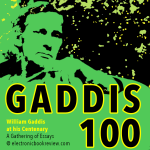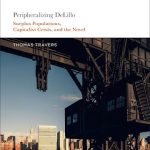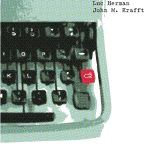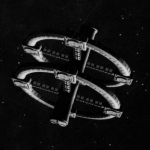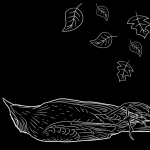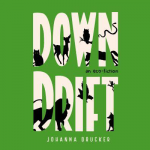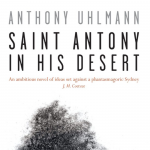2024
Moody's interview is a story about how stories get published, the people who publish, and the perils of single-copy print manuscripts moving through FedEx prior to digital tracking, as well as: "a snapshot of the intricacies of culture as a whole". As an insider perspective on how literary influence operates to perpetuate a continuum, this interview contributes to our awareness of how 'maximalist' bravura epic-comic literature emerges from mimesis and adoration to seed lineage canons (Keaton, Beckett, Pynchon, Gaddis, Moody).
This roundtable discussion chaired by Ali Chetwynd, featuring artists Stef Aerts, Thomas Verstraeten, David Bird, Edward Holland, and Tim Youd took place at the Gaddis Centenary Conference in St Louis, on October 21st 2022. It has been lightly edited for clarity. Transcript by Marie Fahd.
This roundtable discussion, featuring Danielle Dutton, Edwin Frank, and Martin Riker took place at the Gaddis Centenary Conference in St Louis, on October 21st 2022. It has been lightly edited for clarity and was transcribed by Marie Fahd.
Chaired by Rone Shavers, transcribed by Marie Fahd, and joined by Jeff Jackson and Jacob Singer, this roundtable and discussion took place at the Gaddis Centenary Conference in St Louis, on October 22nd 2022. It has been lightly edited and expanded.
Synthesising the published record, Ted Morrissey chronicles and analyzes the relationship between literary Williams Gaddis and Gass, which began in 1976 after Gass had helped secure the National Book Award for Gaddis's J R. Morrissey examines not only the pair's shared social history of meetings, conferences, and letters, but also examines the commonalities in their approaches to literature, and their affinities of taste, habit, and vision.
In his review of Thomas Travers' book "Peripheralizing DeLillo", Conte explores the thematic undercurrents of capitalism and its discontents across Don DeLillo's oeuvre.
Benjamin Bergholz provides a detailed description of the neoliberal hellscape prophesized in J R. Bergholz identifies a dialectical relationship between our necessary failure as readers to fully comprehend the full details of J R's world, and the historical developments—mainly, the "end of history"—that drive this failure. He asks, how might Gaddis’s decision to impair the reader’s "ability to see what is happening" in the world of his novel help us better engage with "what is happening" in the world outside of it?
Traces of Vaihinger appear in Gaddis’s first novel, The Recognitions. But what of the rest of his corpus? John Soutter explores Vaihinger's influence on Gaddis.
We asked our contributors a set of simple questions: what do you think Gaddis Studies has best covered already, what do you think are its prospects for the future, and what future avenues would you like to see explored?
Ali Chetwynd's introduction to the Gaddis centenary gathering on ebr.
A talk given on October 20th 2022 at the William Gaddis Centenary Conference at Washington University St Louis. The version presented here is the talk as delivered, with minor edits only for clarity on the page and standardized grammar. Steven Moore prefers to leave the talk as a document of its original presentation, rather than changed into an academic article with the attendant scholarly apparatus of footnotes, works cited, and so on.
Little is know about the famously private Thomas Pynchon, but can we learn anything from an early manuscript of V.? Hanjo Berressem reviews Becoming Pynchon by Luc Herman and John M. Krafft.
2021
Bruce Clarke focuses transhumanism through the dialects of a neocybernetic systems theory (NST). As Clarke explores the dynamics of a NST, he outlines important components of the AI Imaginary—or, the theoretical and mediated discussions of intelligent technologies--in order to explore how machines, humans, and systems can work together. Specifically, he presents Kim Stanley Robinson’s novel Aurora (2015), as an exception to the AI Imaginary in its representation of “a solidarity that regathers rather than alienates human and machine beings.”
Wright explores the digital manifestation of an orihon manuscript style for how it can expand how we think of the novel's form. He considers how digital versions of J.M. Coetzee's Diary of a Bad Year and his own print novella make use of the concept of the fold as identified in the orihon style.
Dani Spinosa asks Bertrand Gervais about the place of digital literatures across Francophone and Anglophone Canada, the issue of genre and labelling in the field, and his work with NT2. Gervais here foregrounds the ground-breaking contributions of Québécois writers, artists, and scholars that are foundational to Canadian digital humanities and media studies across the country, and speaks to how important it is that digital publishing prioritize accessibility and evolution.
2020
Whilst reading Stéphane Vanderhaeghe’s dystopian fiction and touching on Bernard Stiegler's Age of Disruption, Greg Hainge explores the world that now reads us via a universal digitisation.
After a programmatic attempt to taxonomize the genre of biographical fiction, Lackey's actual interviews with the genre's representative authors tend to uphold the willfully untamable nature of fiction. Image by Joanna Portelli
2019
A book-review meditation-musing by David (Jhave) Johnston on a multimodal science fiction by Johanna Drucker. The story is told from the point of view of a distributed organism, Archaea that was discovered in the 1970s. "Structurally similar to bacteria but chemically-distinct," this entity suggests what a born-digital literature for the posthuman era might look like: "an epoch when human-level consciousness drifts down into animals, insects, fish" and many other others.
A roundtable discussion hosted by Karl Knausgaard's Alma Mater in Bergen, Norway.
For Martin Eve, Anthony Uhlmann appears to be writing for a very small audience: "those who are interested in contemporary mutations in metafiction, autofiction, and post-postmodern sensibilities."
